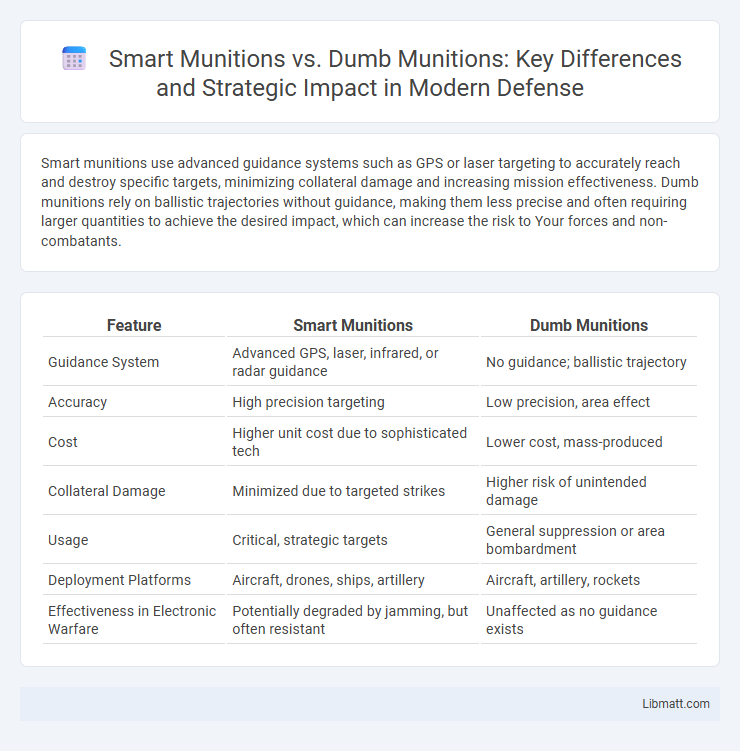Smart munitions use advanced guidance systems such as GPS or laser targeting to accurately reach and destroy specific targets, minimizing collateral damage and increasing mission effectiveness. Dumb munitions rely on ballistic trajectories without guidance, making them less precise and often requiring larger quantities to achieve the desired impact, which can increase the risk to Your forces and non-combatants.
Table of Comparison
| Feature | Smart Munitions | Dumb Munitions |
|---|---|---|
| Guidance System | Advanced GPS, laser, infrared, or radar guidance | No guidance; ballistic trajectory |
| Accuracy | High precision targeting | Low precision, area effect |
| Cost | Higher unit cost due to sophisticated tech | Lower cost, mass-produced |
| Collateral Damage | Minimized due to targeted strikes | Higher risk of unintended damage |
| Usage | Critical, strategic targets | General suppression or area bombardment |
| Deployment Platforms | Aircraft, drones, ships, artillery | Aircraft, artillery, rockets |
| Effectiveness in Electronic Warfare | Potentially degraded by jamming, but often resistant | Unaffected as no guidance exists |
Introduction to Smart and Dumb Munitions
Smart munitions incorporate advanced guidance systems such as GPS, laser, or infrared targeting, enabling precise strikes that minimize collateral damage and increase battlefield effectiveness. Dumb munitions, or unguided bombs, rely solely on ballistic trajectories and the skill of the operator, often resulting in less accuracy and higher risks of unintended damage. The evolution from dumb to smart munitions marks a significant advancement in modern warfare technology, emphasizing precision and controlled targeting.
Defining Smart Munitions: Features and Technology
Smart munitions incorporate advanced guidance systems such as GPS, laser, infrared, or radar to accurately track and engage designated targets, significantly enhancing precision and reducing collateral damage. These weapons leverage embedded sensors, onboard computing, and real-time data processing to adjust flight paths and ensure impact on dynamic or stationary targets. In contrast to traditional dumb munitions, smart munitions minimize waste and increase mission effectiveness through autonomous target acquisition and adaptive targeting technology.
What Are Dumb Munitions? Traditional Capabilities
Dumb munitions, also known as unguided bombs or artillery shells, rely solely on ballistic trajectory and gravity for targeting, lacking any onboard guidance systems. Traditional capabilities of dumb munitions include simplicity, cost-effectiveness, and mass deployment with large destructive potential, but they suffer from limited accuracy and higher collateral damage risk. Your military strategy might involve dumb munitions when precision is less critical, but their inefficiency in high-precision scenarios often leads to considering smart alternatives.
Accuracy Comparison: Smart vs. Dumb Munitions
Smart munitions leverage advanced guidance systems like GPS, infrared, and laser targeting to achieve pinpoint accuracy, significantly reducing collateral damage and increasing mission success rates. Dumb munitions rely on ballistic trajectories without guidance, resulting in lower accuracy and a higher probability of missing targets or causing unintended damage. Your choice between smart and dumb munitions directly impacts operational efficiency, with smart munitions offering superior precision and effectiveness in modern warfare scenarios.
Cost Analysis: Investment and Lifecycle
Smart munitions require a significantly higher initial investment due to advanced guidance systems and onboard technology, but their precision reduces collateral damage and ammunition waste, potentially lowering overall operational costs. Dumb munitions have a lower upfront cost but often need larger quantities and additional support for target adjustment, increasing lifecycle expenses. Your decision should weigh the balance between higher upfront expenditure for long-term efficiency versus the simplicity and lower immediate purchase price of dumb munitions.
Operational Flexibility and Tactical Advantages
Smart munitions offer greater operational flexibility by enabling precise targeting and minimizing collateral damage, which is crucial in dynamic combat environments. Their advanced guidance systems allow adaptation to changing battlefield conditions, enhancing tactical advantages such as the ability to engage moving targets and conduct complex strike missions. Your forces benefit from increased effectiveness and reduced ammunition expenditure compared to dumb munitions, which lack guidance and rely solely on initial trajectory and impact.
Impact on Collateral Damage and Civilian Safety
Smart munitions utilize precision guidance systems that significantly reduce collateral damage by accurately targeting enemy positions, thereby enhancing civilian safety in conflict zones. Dumb munitions lack such guidance, often resulting in widespread, unintended destruction and increased risk to non-combatants. Your choice to deploy smart munitions can improve mission effectiveness while minimizing harm to surrounding populations.
Logistics and Supply Chain Considerations
Smart munitions require advanced logistics and supply chain infrastructure due to their complex electronics and software components, which demand specialized storage, handling, and maintenance compared to dumb munitions. Your supply chain must integrate precise inventory tracking and ensure timely updates to firmware and targeting data for smart munitions, whereas dumb munitions primarily rely on traditional ammunition supply protocols focusing on bulk transport and storage. Efficient management of smart munitions involves higher costs and coordination across multiple technical support teams to maintain operational readiness and reliability in dynamic combat environments.
Battlefield Case Studies: Real-World Deployment
Smart munitions demonstrated decisive superiority during the Gulf War, where precision-guided bombs (PGMs) minimized collateral damage and increased target accuracy against Iraqi forces. In contrast, dumb munitions, such as unguided bombs, were extensively used in Vietnam with less precision, often resulting in higher civilian casualties and collateral destruction. Recent conflicts, including operations in Afghanistan, highlight smart munitions' enhanced effectiveness in urban warfare, leveraging advanced GPS and laser guidance to neutralize insurgents while protecting non-combatants.
Future Trends and Technological Advancements
Smart munitions are rapidly evolving with advancements in AI, precision guidance systems, and real-time data integration, leading to increased accuracy and reduced collateral damage compared to traditional dumb munitions. Future trends emphasize autonomous targeting, networked weapon systems, and enhanced adaptability to dynamic combat environments, making smart munitions more efficient and cost-effective over time. Your strategic operations can greatly benefit from integrating these cutting-edge technologies to improve mission success and minimize unintended consequences.
Smart munitions vs Dumb munitions Infographic

 libmatt.com
libmatt.com